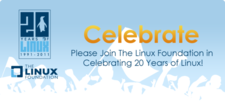Announcements from the 5th Annual Linux Collaboration Summit
The Linux Foundation kicked off the 5th Annual Linux Collaboration Summit with four announcements: the formation of the new High Availability working group, the release of the Carrier Grade Linux 5.0 specification, Yocto Project Release 1.0 availability, and the 20th Anniversary Video Contest.
20th Anniversary of Linux Video Contest was launched and to help inspire people to produce and submit a video, the Linux Foundation kicked off this celebration with the release of "The Story of Linux" video. Linus Torvalds, Linux creator, will choose the best video and the winner of the 20th Anniversary of Linux Video Contest will be announced at LinuxCon in Vancouver. For those who are interested in submitting a video, the submissions should show and celebrate the impact of Linux on computing, business or culture over the last 20 years.
Yocto Project 1.0 was released. The Yocto Project is an open source collaboration project that provides templates, tools and methods to help you create custom Linux-based systems for embedded products regardless of the hardware architecture. More information about the the 1.0 release can be found in the release notes and on the Yocto Project website.
The release of Carrier Grade Linux (CGL) 5.0 specification announced. Since 2001 The Linux Foundation’s CGL workgroup has been collaborating on CGL gaps and requirements, and release of CGL 5.0 covers several specification categories that include Availability, Clustering, Serviceability, Performance, Standards,Hardware, and Security. The Linux Foundation says that currently there are six CGL distributions from major Linux distributors including Novell, MontaVista and Wind River, which are all registered as CGL-compliant.
The full CGL 5.0 specification is available for review on the Linux Foundation Website.
The formation of the new High Availability working group announced. According to the Linux Foundation, the Working Group will bring together projects and stakeholders to collaboratively define the open source HA software stack and prioritize featuresbased on input from developers, vendors, and customers. The projects participating in the forum hosted by The Linux Foundation include: corosync, DRBD, GFS2, hawk, Linux-HA, Linux Virtual Server, luci, OCFS2,Open Clustering Framework, and pacemaker. Enterprise Linux distributions such as as Debian, Fedora, openSUSE, and Ubuntu, are already incorporating this technology and plan to contribute to the working group.
Subscribe to our Linux Newsletters
Find Linux and Open Source Jobs
Subscribe to our ADMIN Newsletters
Support Our Work
Linux Magazine content is made possible with support from readers like you. Please consider contributing when you’ve found an article to be beneficial.

News
-
Introducing matrixOS, an Immutable Gentoo-Based Linux Distro
It was only a matter of time before a developer decided one of the most challenging Linux distributions needed to be immutable.
-
Chaos Comes to KDE in KaOS
KaOS devs are making a major change to the distribution, and it all comes down to one system.
-
New Linux Botnet Discovered
The SSHStalker botnet uses IRC C2 to control systems via legacy Linux kernel exploits.
-
The Next Linux Kernel Turns 7.0
Linus Torvalds has announced that after Linux kernel 6.19, we'll finally reach the 7.0 iteration stage.
-
Linux From Scratch Drops SysVinit Support
LFS will no longer support SysVinit.
-
LibreOffice 26.2 Now Available
With new features, improvements, and bug fixes, LibreOffice 26.2 delivers a modern, polished office suite without compromise.
-
Linux Kernel Project Releases Project Continuity Document
What happens to Linux when there's no Linus? It's a question many of us have asked over the years, and it seems it's also on the minds of the Linux kernel project.
-
Mecha Systems Introduces Linux Handheld
Mecha Systems has revealed its Mecha Comet, a new handheld computer powered by – you guessed it – Linux.
-
MX Linux 25.1 Features Dual Init System ISO
The latest release of MX Linux caters to lovers of two different init systems and even offers instructions on how to transition.
-
Photoshop on Linux?
A developer has patched Wine so that it'll run specific versions of Photoshop that depend on Adobe Creative Cloud.



